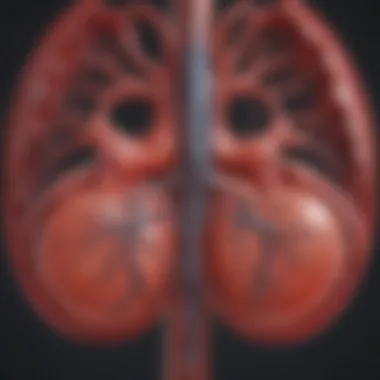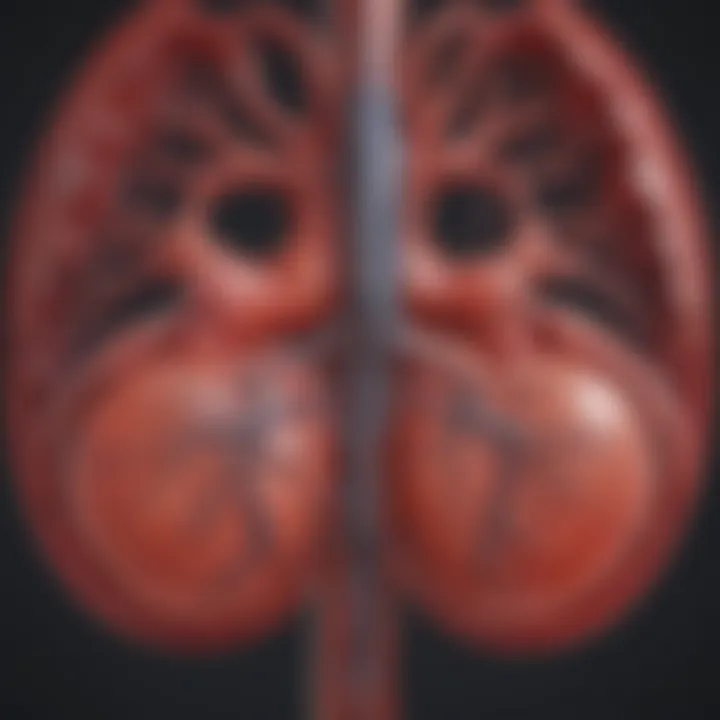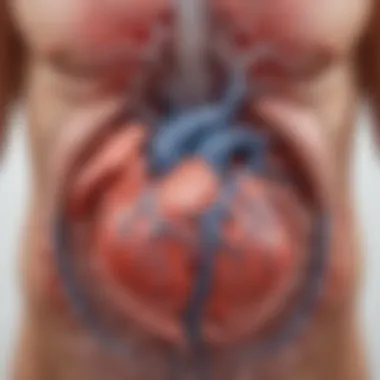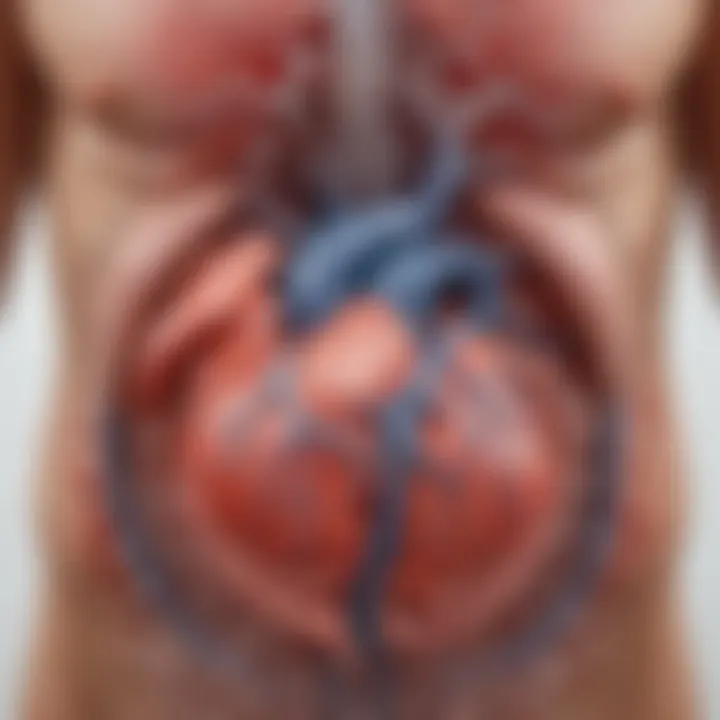Dialysis and Heart: The Interplay of Renal and Cardiac Health


Intro
The relationship between renal health and cardiac function is complex and multifaceted. Patients with kidney disease frequently face complications related to heart health, and conversely, those with heart conditions may experience renal insufficiency. As a result, it is essential to explore how dialysis treatment impacts cardiovascular health and understand the physiological mechanisms involved in this interaction. The information provided here aims to illuminate the interconnectedness of renal and cardiac health, emphasizing the importance of integrated care for patients experiencing both conditions.
Recent Advances
Latest Discoveries
Recent research has significantly contributed to our understanding of dialysis' effects on heart health. One key discovery is that patients undergoing dialysis often exhibit increased levels of cardiovascular morbidity. Studies reveal that these individuals are at an elevated risk for myocardial infarction, heart failure, and stroke. The underlying causes include fluid overload, electrolyte imbalances, and anemia, which are common in patients on dialysis. By identifying these risks, healthcare providers can implement targeted strategies to mitigate cardiovascular complications.
Moreover, investigatons into the role of inflammation in patients undergoing dialysis have gained traction. Inflammation not only adversely affects renal function but also plays a critical role in heart disease. It is essential for clinicians to consider inflammatory markers and their management as part of a comprehensive treatment strategy.
Technological Innovations
Technological advancements are enhancing the management of dialysis and heart health. The advent of wearable monitoring devices allows for real-time tracking of vital signs. This technology can provide timely data on blood pressure, heart rate, and fluid status, resulting in better individualized treatment plans.
Furthermore, telemedicine options have emerged, enabling nephrologists and cardiologists to collaborate more effectively while broadening access to specialized care for patients. This innovation can lead to earlier intervention, improved health outcomes, and ultimately reduce hospitalizations and associated healthcare costs.
"The intersection of renal and cardiac health represents a critical area of research that can lead to improved patient outcomes through innovative treatment strategies."
Methodology
Research Design
A systematic review approach can offer valuable insights into how dialysis impacts cardiac health. This entails a thorough examination of varying research studies that analyze the relationships between renal treatment and cardiac complications. Focusing on a range of patient demographics, including age, gender, and pre-existing conditions, provides a comprehensive view of the issue.
Data Collection Techniques
Data collection in studies of this nature typically employs both quantitative and qualitative techniques. Quantitative data may include clinical outcomes from patient records post-dialysis, while qualitative data may be collected through patient interviews or surveys. This dual approach is critical for gaining insights into both statistical correlations and personal experiences, painting a full picture of the interconnectedness between renal and cardiac health.
Understanding these connections not only informs clinical practice but also guides future research, where an interdisciplinary approach involving nephrologists and cardiologists can enhance the care provided to patients suffering from both conditions.
Prolusion
The topic of dialysis and heart health is critical in understanding the complex interplay between renal and cardiac systems. For patients with kidney failure, the choice of how to manage their condition has paramount implications for cardiac health. Dialysis therapy provides a means to remove toxins and excess fluid, but it can also introduce various risks to heart function.
With a growing aging population, the prevalence of renal disease is increasing, necessitating an in-depth examination of renal-cardiac connections. This is not just about treating the kidney; understanding how dialysis affects the heart is essential for comprehensive patient care.
The relationship between kidney health and cardiovascular function is reciprocal. Renal insufficiency can lead to changes in heart function due to imbalances in electrolytes and fluid, while heart problems can exacerbate kidney function. Through this exploration, we highlight the importance of integrated care strategies to improve patient outcomes. The following sections will elucidate the physiological underpinnings, types of dialysis, and how they relate to heart health.
Overview of Dialysis
Dialysis is a medical intervention that replicates some of the functions of healthy kidneys. It is generally categorized into two main types: hemodialysis and peritoneal dialysis. Hemodialysis involves filtering blood through a machine, while peritoneal dialysis uses the lining of the abdomen to filter waste and fluids.
The main aim of dialysis is to eliminate waste, maintain electrolyte balance, and regulate fluid levels. By doing so, it helps relieve symptoms related to kidney failure, such as fatigue, swelling, and high blood pressure.
Dialysis plays a vital role in prolonging life for patients suffering from end-stage renal disease. However, understanding the cardiovascular implications of this treatment is also crucial in guiding patient management.
Understanding Heart Function
Heart function refers to the way the heart pumps blood throughout the body, delivering essential oxygen and nutrients to organs and tissues. The heart's efficiency is influenced by numerous factors, including blood volume, pressure, and overall vascular health.
The heart is composed of chambers, valves, and muscle tissue, all working in concert to maintain circulation. Any disturbance in this system can lead to complications. In patients with kidney disease, the accumulation of waste products can provoke hypertension and potentially lead to heart failure.
Thus, understanding how the heart operates and responds to various treatments, like dialysis, is paramount. Patients undergoing dialysis must be closely monitored to prevent cardiac complications, which may arise due to the physical stress of the procedure, along with changes in fluid balance and electrolytes.
A comprehensive appreciation of heart function provides a foundation for recognizing how renal issues can affect cardiac health.
The Kidney-Heart Connection


Understanding the kidney-heart connection is vital to grasp how renal health directly influences cardiac function. The kidneys and heart work synergistically to regulate body fluids, electrolytes, and blood pressure. In patients with kidney disease, cardiovascular health often declines due to multifaceted interactions between both organ systems. Thus, it is crucial to study their interrelationship, especially in the context of dialysis, which profoundly affects both organs.
Physiological Links Between Kidney and Heart
The kidneys filter waste and excess substances from the blood, maintaining proper electrolyte balance. The heart's function relies heavily on these electrolytes. For example, potassium and sodium levels are critical for cardiac muscle contraction and rhythm. Thus, when the kidneys fail to manage these levels, the heart is affected. Elevated potassium can lead to severe cardiac complications, including arrhythmias. Conversely, the heart works continuously to pump blood, maintaining renal perfusion.
An imbalance in blood pressure regulation also highlights their connection. The kidneys produce hormones such as renin that help control blood pressure. If renal function deteriorates, these hormonal responses can lead to hypertension, which further strains cardiac function. Such hypertension is well-documented among dialysis patients, showcasing the physiological interplay between the two organs.
Additionally, both organs share inflammatory pathways. Chronic kidney disease is associated with increased systemic inflammation, which can have detrimental effects on cardiovascular health. This almost cyclical relationship makes the understanding of kidney-heart physiology pivotal in managing overall health in patients experiencing renal failure.
Effects of Renal Failure on Cardiac Health
Renal failure significantly impacts cardiac health, presenting as escalating cardiovascular risks. Studies show that patients with chronic kidney disease exhibit a higher prevalence of coronary artery disease and heart failure. The retention of uremic toxins due to kidney impairment contributes to heart stress and dysfunction.
Notably, dialysis also comes with its own set of challenges. The procedure can often lead to fluctuating blood pressures and volume overload, putting additional strain on the heart. Specifically, patients undergoing hemodialysis experience changes in fluid dynamics, which can exacerbate heart disease risk.
Furthermore, renal failure can lead to alterations in lipid metabolism, often resulting in dyslipidemia. This condition increases the likelihood of plaque buildup in arteries, leading to a higher chance of heart attacks. Thus, it is essential to monitor and manage these underlying conditions closely in dialysis patients.
In summary, understanding the kidney-heart connection is imperative for improving patient outcomes. Clinicians must take this connection into account when designing treatment plans, ensuring a holistic approach that considers the intricate relationship between renal and cardiac health.
Types of Dialysis
The topic of dialysis is significant due to its role in managing renal failure and its wide-reaching implications for cardiac health. Understanding the different types of dialysis is fundamental for patients and healthcare providers alike. Each method has its specific benefits, considerations, and potential impacts on overall health. This section will discuss hemodialysis, peritoneal dialysis, and a comparison of both methods, providing insights into how these treatments affect kidney function and cardiovascular health.
Hemodialysis
Hemodialysis is a common method used to treat individuals with chronic kidney disease. This process involves the removal of waste products and excess fluids from the blood, utilizing a machine called a dialyzer. The blood is drawn out, cleaned, and then returned to the body. Typically, hemodialysis is performed three times a week for about four hours per session at a dialysis center.
The primary advantage of hemodialysis is its effectiveness in quickly clearing toxins from the bloodstream. Patients often experience noticeable improvements in symptoms post-session. However, adherence to the treatment schedule can be challenging for many.
Key Considerations for Hemodialysis:
- Strict adherence to treatment schedule is crucial.
- Patients may experience side effects such as low blood pressure, cramping, or fatigue.
- Access points for blood removal can lead to potential complications, such as infection.
The impact of hemodialysis on cardiac health is substantial. Patients often face higher risks of developing cardiovascular disease due to fluid overload and electrolyte imbalances.
Peritoneal Dialysis
Peritoneal dialysis is another vital treatment option for renal failure patients. This method uses the lining of the abdomen, known as the peritoneum, as a natural filter. A catheter is inserted into the abdomen, allowing a special solution, called dialysate, to flow in. This solution absorbs waste products, and after a set period, it is drained out along with the waste.
Peritoneal dialysis can be performed at home, offering more flexibility in treatment schedules. This flexibility may lead to improved quality of life for many patients. Patients can engage in more daily activities compared to those on hemodialysis.
Key Considerations for Peritoneal Dialysis:
- Patients need to maintain a sterile environment to prevent peritonitis, an infection of the abdominal cavity.
- Regular monitoring of weight and blood sugar levels is critical to prevent complications.
- The efficiency of waste removal can vary based on the individual’s body size and disease state.
While peritoneal dialysis allows for greater autonomy, it also comes with its own set of risks and considerations, especially regarding cardiac health, as fluid balance can still affect heart function.
Comparison of Dialysis Types
When comparing hemodialysis and peritoneal dialysis, several factors should be taken into account:
- Location: Hemodialysis is typically conducted in a clinical setting, while peritoneal dialysis can be done at home.
- Time Commitment: Hemodialysis requires fewer hours per week, but in a clinical setting, while peritoneal dialysis may involve daily treatments.
- Potential for Complications: Each method has its complications, including infection risks and vascular access issues for hemodialysis, and peritonitis for peritoneal dialysis.
- Impact on Cardiac Health: Both methods have implications on heart health, necessitating careful monitoring of fluid status and electrolyte balance.
In summary, selecting the appropriate type of dialysis must account for individual patient needs, lifestyle, and associated cardiovascular considerations. Each type of dialysis presents unique benefits and challenges that impact both renal and cardiac health. The choice between hemodialysis and peritoneal dialysis should involve a thorough discussion between the healthcare provider and the patient.
Impact of Dialysis on Cardiac Function
Understanding the impact of dialysis on cardiac function is crucial for both practitioners and patients. The effects of renal treatment extend beyond the kidneys, influencing various aspects of cardiovascular health. As such, it is important to assess the factors that connect these two vital systems. Potential benefits include managing symptoms related to heart failure, but there are also numerous considerations that healthcare providers must address. Through an analysis of electrolyte imbalances, hypertension, and congestive heart failure risks, this section aims to highlight the complexity of this interplay.
Electrolyte Imbalances


Electrolytes play a vital role in maintaining normal heart rhythm and function. In patients undergoing dialysis, disruptions in electrolyte levels are common. Conditions such as hyperkalemia, hypocalcemia, and hyperphosphatemia can arise due to the kidneys’ inability to filter waste effectively.
- Hyperkalemia, in particular, can lead to severe cardiac arrhythmias, potentially resulting in life-threatening situations. Dialysis treatment often aims to remove excess potassium from the blood, but fluctuations can still occur between sessions.
- Calcium and phosphate imbalances can subsequently affect cardiac contractility, leading to further complications.
Addressing these imbalances is critical. Regular monitoring and tailored adjustments to dialysis settings may help in alleviating these risks, ensuring the heart remains healthy while managing renal disease.
Hypertension in Dialysis Patients
Hypertension, or high blood pressure, is a prevalent concern for patients receiving dialysis. The relationship between kidney health and blood pressure regulation is intricate. The kidneys play a key role in regulating blood volume and, consequently, blood pressure. When kidney function declines, this regulation falters, often leading to increased blood pressure levels.
Common contributing factors include:
- Fluid overload due to impaired fluid removal.
- Hormonal changes, such as alterations in the renin-angiotensin system.
Management of hypertension is essential for preventing complications like heart attack and stroke in dialysis patients. Treatment often involves a combination of lifestyle changes, dietary modifications, and medications. Practitioners must work diligently to monitor blood pressure levels before and after dialysis sessions to ensure optimal outcomes.
Congestive Heart Failure Risk
Patients on dialysis have an elevated risk of developing congestive heart failure, a condition where the heart struggles to pump blood effectively. This is often linked to the cumulative effects of kidney disease and the stress dialysis places on the cardiovascular system. The risk factors include:
- Fluid accumulation, leading to increased cardiac workload.
- Electrolyte imbalances affecting heart function.
- Hypertension from fluid overload and hormonal changes.
"Congestive heart failure is not a single condition but a complex interplay of factors affecting the heart and kidneys."
Preventative measures should focus on early detection and management of heart failure symptoms, including regular assessments of ejection fraction and monitoring for symptoms such as shortness of breath or fatigue. With proactive care, the risk of serious cardiac events can be mitigated.
In summary, understanding the impact of dialysis on cardiac function encompasses various interconnected factors. From electrolyte management to monitoring blood pressure and assessing heart failure risk, healthcare providers must adopt a comprehensive approach to safeguard cardiac health in patients undergoing dialysis.
Cardiovascular Disease in Dialysis Patients
The intertwined relationship between dialysis and cardiovascular health is significant. Dialysis patients are at a high risk for cardiovascular disease due to multiple factors stemming from their renal conditions.
Cardiovascular disease encompasses a range of heart-related issues, including coronary artery disease, heart failure, and arrhythmias. This complex interplay between the kidneys and the heart requires a thorough understanding of the mechanisms involved. As such, healthcare professionals must consider cardiovascular health when managing patients undergoing dialysis. Addressing heart health can improve patient outcomes and quality of life.
Prevalence of Cardiac Conditions
Studies indicate a striking prevalence of cardiac conditions among individuals on dialysis. Approximately 30% to 60% of dialysis patients experience some form of cardiovascular disease. This figure highlights a critical area for intervention and monitoring. The high prevalence is influenced by several factors, including:
- Fluid Overload: Dialysis patients often retain fluid, leading to increased blood pressure and heart strain.
- Electrolyte Imbalances: Imbalances, notably potassium and calcium, can have immediate consequences on cardiac rhythm and overall heart function.
- Anemia: Often present in patients with kidney failure, anemia can exacerbate heart conditions as the heart works harder to supply oxygen to tissues.
The risk of cardiac events rises significantly when compared to the general population. Therefore, regular cardiovascular assessment is essential for these patients.
Dyslipidemia and Dialysis
Dyslipidemia is another important consideration for dialysis patients. This condition describes abnormal levels of cholesterol and triglycerides in the blood. In individuals undergoing dialysis, several mechanisms can lead to dyslipidemia, including:
- Altered Metabolism: Kidney disease affects lipid metabolism, contributing to an increase in LDL cholesterol (often termed 'bad cholesterol').
- Inflammation: Chronic inflammation seen in kidney disease can negatively influence lipid profiles.
Managing dyslipidemia is crucial because elevated cholesterol levels can further increase the risk of atherosclerosis, leading to cardiovascular complications. Interventions may include dietary changes, medications such as statins, and regular monitoring of lipid profiles.
"Understanding the prevalence of these conditions is key for healthcare providers in optimizing treatment plans for dialysis patients."
Management Strategies
The management of cardiac health in dialysis patients is crucial. This group often faces a higher risk of cardiovascular diseases. Understanding effective management strategies can help reduce complications. It ensures better outcomes for those undergoing dialysis. The integration of renal and cardiac care is necessary to achieve holistic patient management. Below are several key elements that are vital in managing the health of these patients.
Monitoring Cardiac Health
Regular monitoring of cardiac health is essential for patients receiving dialysis. This includes periodic evaluations of heart function, blood pressure and electrolyte levels. Physicians use echocardiograms and ECGs to assess heart performance. These tests help identify potential complications early. Patients should also be aware of any symptoms of heart distress. This might include shortness of breath or chest pain.
"Active monitoring can prevent severe heart issues and improve quality of life for dialysis patients."


Recording changes in symptoms and discussing them with healthcare providers is important. Establishing a continuous communication channel between patients and their renal care team can enhance monitoring efforts.
Medication Management
Medication management is another key area that requires careful attention. Dialysis patients often take multiple medications. These might include antihypertensives, diuretics, and statins. Each medication serves a specific purpose. For instance, antihypertensives help manage high blood pressure, which is common in dialysis patients.
It's vital that healthcare providers regularly review these medications. This ensures that dosages remain appropriate and that new medications are safely integrated. Polypharmacy can lead to adverse effects or negative interactions, increasing the risk of cardiovascular complications.
Lifestyle Adjustments
Lifestyle adjustments play an important role in improving both kidney and heart health. Patients should focus on maintaining a balanced diet. This often involves reducing sodium intake to control blood pressure and fluids. Regular physical activity is also recommended, as it helps strengthen the heart and improves overall well-being.
Patients should also avoid smoking and limit alcohol consumption. These changes are not easy, but they are necessary. Involvement of a dietitian can provide tailored advice based on the specific needs of patients. Furthermore, educating patients about the importance of these changes will encourage adherence to their treatment plans.
Emerging Research
Emerging research in the field of dialysis and cardiovascular health is crucial. This area is continually evolving, providing insights that can change treatment paradigms and improve patient outcomes. As the connection between kidney and heart health becomes more clear, understanding recent findings becomes necessary. Physicians and researchers can adapt practices based on this new knowledge. This may help mitigate the significant risks dialysis patients face concerning heart diseases.
Current research efforts focus on uncovering the intricate mechanisms linking dialysis treatment and cardiac health. Innovations can enhance existing therapies and develop novel strategies for managing patients with chronic conditions. Such studies can yield results that influence how healthcare providers approach patient education, monitoring, and overall care.
Another vital aspect of emerging research is its role in assessing the effectiveness of various treatment options. For instance, studies are investigating different dialysis techniques and how they interact with cardiovascular functions. This involves examining various elements like electrolytes, fluid balances, and the impact of dialysis on heart muscle efficiency. Understanding these factors allows healthcare professionals to tailor treatment plans more effectively, optimizing care for patients.
"Continued exploration in dialysis and cardiovascular health can lead to groundbreaking revelations that save lives and improve overall quality of life for affected individuals."
Consequently, as more studies emerge, it becomes necessary to stay updated. This ensures that patients receive evidence-based treatment and care tailored to their unique needs. The integration of both nephrology and cardiology research helps create holistic treatment plans, resulting in better management of comorbid conditions.
Current Studies on Dialysis and Cardiovascular Health
Current studies focus on various aspects of how dialysis affects cardiovascular health. Some research explores friction between the complexities of dialysis treatment and the subsequent risks posed to heart health. For example, studies have shown that patients on hemodialysis are at an increased risk for heart-related issues. This is due to various factors connected to kidney function, fluid overload, and inflammatory responses.
Researchers are also exploring the role of inflammation in renal patients. Chronic inflammation is not only a concern for kidney health but is also a significant factor in heart disease. By understanding this relationship, scientists can better design interventions that target both organ systems simultaneously. This can lead to more effective management strategies for patients who often suffer from both renal and cardiac issues.
Additionally, there are ongoing studies examining the effects of different dialysis modes on cardiovascular outcomes. For instance, researchers are investigating how peritoneal dialysis versus hemodialysis impact heart muscle function, heart rhythms, and overall cardiovascular risk profiles.
Potential Innovations in Treatment
Innovations in treatment are pivotal as the medical field grapples with improving patient outcomes in dialysis and cardiovascular health. New approaches are explored that may significantly alter patient management. For instance, advancements in biocompatible materials for dialysis filters have the potential to lessen inflammation during treatment sessions. This can directly address inflammation's role in cardiovascular risk, offering a dual benefit.
Another area of exploration includes remote monitoring technologies. These innovations could lead to better management of patients at home, allowing healthcare providers to intervene sooner if heart issues arise during dialysis. Wearable devices that track heart rate, blood pressure, and fluid retention can provide critical real-time data, enhancing patient safety
Furthermore, studying dietary interventions and adjustments is underway. For instance, specific diets tailored for renal protection may also benefit heart health, thereby addressing both conditions concurrently. Nutritional science plays an increasingly important role as researchers identify foods that can aid in reducing overall cardiovascular risks in dialysis patients.
Epilogue
The conclusion in this article remains vital to understand the intricate relationships between dialysis treatment and cardiac health. This section draws together key insights gathered from previous sections, emphasizing the interconnected nature of renal and cardiac functions. A profound understanding of how renal dysfunction affects cardiac health aids healthcare professionals and patients in designing effective management protocols.
As the prevalence of kidney disease continues to rise, addressing cardiac complications associated with its treatment becomes increasingly important. Effective management of these complications not only facilitates better patient outcomes but also enhances overall quality of life for those receiving dialysis.
Healthcare providers must prioritize multidisciplinary approaches that look at both renal and cardiac health to improve holistic patient management. Regular monitoring and lifestyle adjustments can lead to improved heart health in dialysis patients. Recognizing the significance of these connections creates a platform for better treatment solutions tailored to individual needs.
"In managing the complexities of renal and cardiac conditions, a cohesive treatment strategy emerges as a critical aspect of effective healthcare delivery."
Summarizing Key Insights
In this section, the focus is on revisiting the core themes discussed throughout the article. Key takeaways include:
- The interdependence between kidney and heart functions.
- How renal failure contributes to cardiovascular complications, making timely interventions necessary.
- The role of dialysis methods in managing electrolyte levels and fluid balance, which directly impacts heart health.
- The importance of monitoring cardiovascular risks in patients undergoing dialysis to preempt serious health issues.
Furthermore, the emphasis on multidisciplinary approaches highlights that successful treatment requires collaboration among nephrologists, cardiologists, dietitians, and other healthcare professionals. Engaging patients in their treatment decisions can further enhance adherence to health modifications that improve outcomes.
Future Directions in Research
Research is critical in this domain, paving the way for better treatment options and improved patient care. Future studies should focus on:
- Innovative dialysis techniques that minimize cardiovascular strain while optimizing renal function.
- Exploring the relationship between biomarkers and cardiovascular risks in dialysis patients, potentially leading to predictive models.
- Evaluating the efficacy of new medications specifically targeting cardiac health in those undergoing renal treatment.
- Assessing the impact of lifestyle interventions on cardiovascular health, determining how factors such as diet, exercise, and stress management influence outcomes.
By continuously seeking to expand knowledge in the realm of renal-cardiac interactions, patients can benefit greatly from tailored interventions enhancing both kidney and heart health. The advances in research are essential not only for patients currently in treatment but also for those at risk of developing chronic conditions.















